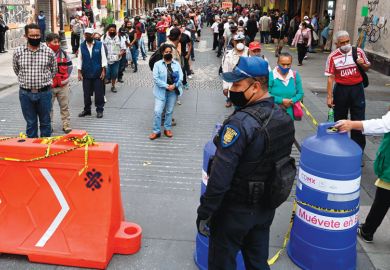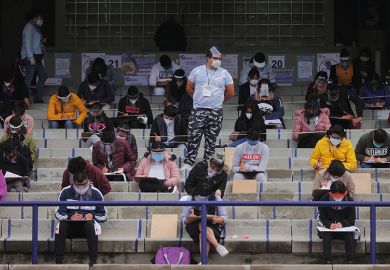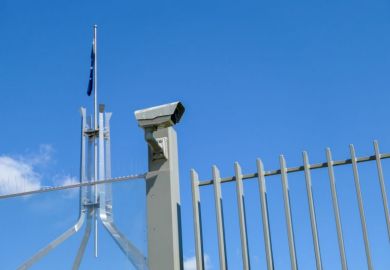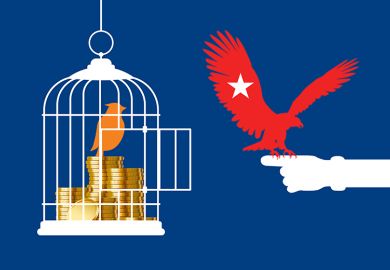Attempts to lock up 31 academics have shown that the Mexican government is escalating the persecution of scholars “to another level”, researchers in the country have said.
Mexico’s attorney general, Alejandro Gertz Manero, is attempting to bring charges against a group of scientists and researchers for a third time and hoping to land them in the notorious Altiplano prison, previously reserved for leaders of drug cartels.
Last month, Dr Gertz Manero charged them with violating a law passed in 2019 that prevents members of an advisory board from receiving money from a government science fund. The academics received $2.5 million (£1.8 million) – crucially, however – years before the law was passed.
A judge denied the warrants, particularly as the respected academics, with no criminal history, faced what many called “outrageous” charges of organised crime, embezzlement and money laundering.
The arrests “sent shock waves throughout the academic community”, according to Beatriz Rumbos, dean of the Division of Actuarial Sciences, Mathematics and Statistics at the Instituto Tecnológico Autónomo de México. The speculation was that “these ridiculous charges are meant to intimidate the academic community”, she said. “It looks extremely unlikely that the organised crime and money-laundering charges will ever be taken seriously by any court, but the intimidation factor is certainly working, and academics are extremely worried, for good reason.”
Academics in Mexico have faced repeated attacks from populist president Andrés Manuel López Obrador and his government since his election in December 2018, with funding cuts and restrictions on how research money is spent.
Alma Maldonado, a higher education researcher at the Center for Research and Advanced Studies at Mexico’s National Polytechnic Institute, said that “for scientists to be treated as criminals” showed that the government had “escalated its persecution to another level”.
Mr Obrador’s continuing hostility towards academics was clear, she said: “Describing them as corrupt, saying that when they study abroad, they learn to be corrupt, that they are privileged people who don’t care about wider societal problems.”
Dr Maldonado, also a visiting professor at the University of Arizona, said the attack on the group, who had worked at the Consulting Forum for Science and Technology, an independent body advising on research policy, also demonstrated the government’s mistrust of academics’ autonomy.
In 2019, the forum had appealed against the sudden removal of its funding. “The climate that is being created is that if you speak out against the government, you are putting yourself at risk,” she added.
This was highlighted earlier this month when Alejandro Madrazo, who was regional director of the Center for Economic Research and Education (CIDE) in Aguascalientes, was fired for his support of a group of researchers demanding improvements in their working conditions, Dr Maldonado added.
The interim director of CIDE had been appointed by Mr Obrador’s government. “A lot is happening that the [academic] community is really concerned about,” Dr Maldonado said.
Professor Rumbos added that there were fears that the president was “after bigger fish” next, such as attacking the independent National Autonomous University of Mexico, which produces almost 30 per cent of the country’s scientific research.
Elena Álvarez-Buylla, the director of Mexico’s National Council for Science and Technology, appointed by Mr Obrador, has also proved antagonistic towards academia, repeatedly criticising what she calls “neoliberal science”, presiding over funding cuts and criticising researchers for their work not being applicable enough to real-world problems.
She recently awarded Dr Gertz Manero, the attorney general who brought the charges against the 31 academics, a place among Mexico’s top researchers, a position he had been denied for years because of accusations that he plagiarised parts of his doctoral thesis. The move caused outcry among Mexico’s academics.
“Academic freedom is at stake,” said Judith Mariscal, director of the Telecommunications Research Program at CIDE.
That the attorney general can bring charges against scientists without proper investigation and that a regional director can be fired without due process has “shown the precarity of the situation [academics] are in”, she said.
However, Professor Mariscal was hopeful that national anger and international attention would steer the government away from continuing down this path.
“There will be a fight. Due process needs to be protected; these are our livelihoods and the democratic institutions that we live in. I see [what’s happening in academia] as a microcosm of what’s happening to the country, so we are also fighting for something bigger,” she added. “I don’t know if we are going to be successful, but we are certainly going to make a lot of noise.”
Register to continue
Why register?
- Registration is free and only takes a moment
- Once registered, you can read 3 articles a month
- Sign up for our newsletter
Subscribe
Or subscribe for unlimited access to:
- Unlimited access to news, views, insights & reviews
- Digital editions
- Digital access to THE’s university and college rankings analysis
Already registered or a current subscriber?








